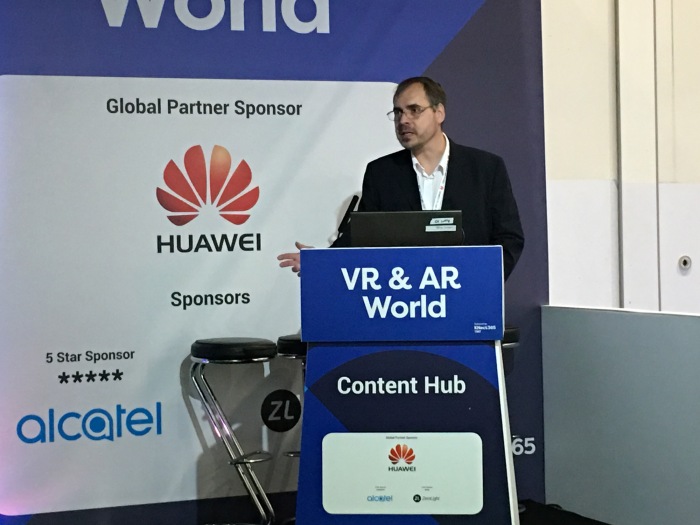//players.brightcove.net/3565746760001/S1wyTDMG_default/index.min.js
Category: Commercialisation
Virtual Reality – Niche or Reality?
FutureSource Consulting analyst Michael Boreham told attendees at VRAR World in London today that we have finally entered an age where VR can become a commercial reality as the hardware and, more importantly, cost had reached a tipping point.
However,Boreham told the audience in his session on Virtual Reality – Niche or Reality that “content is a bit further away, we are still in experiment mode”.
He said that thanks to the recent launches in gaming VR, “games are a bit closer than TV. But there is a lot of experimentation in broadcast”.
Boreham explained that one of the major challenges to the true uptake of VR was monetisation. “It is not cheap to produce this content. Often content is quite short, so getting consumers to pay is difficult.”
“From a consumer point of view, it is more accessible”, he added. “The PS4 and others have helped here. There’s is a lot to be done to raise awareness. But is there an appetite. There is a challenge there in terms of raising appetite.”
Another factor, he told the audience, was awareness. FutureSource research found that only 7% of UK consumers had tried VR, compared with 5% and 4% respectively in Germany and France. In the US, the figure stood at 8% in US.
“Many people, while aware of VR haven’t experienced a truly great VR experience yet,” he said. However, Boreham pointed out that the number of 19 to 35-year-olds that had tried VR was double the average.
“Retail channel is key here, to raise awareness,” he added, especially with the number of consumer releases in gaming. “The console space is beginning to get really interesting,” he said.
FutureSource believes that by 2020 total content revenue will be in excess of USD$6bn worldwide. This will be split 24% to video and 76% games. The gaming VR market, though, at US$4.8bn, is still only 2.5% of the overall gaming market.
“The idea of video VR is an excellent concept, but not all of it works. You have to remember that it is not an extension of traditional TV and broadcast,” he warned. “We have to throw away 100 years of technique. VR is totally different.”
of video VR is an excellent concept, but not all of it works. You have to remember that it is not an extension of traditional TV and broadcast,” he warned. “We have to throw away 100 years of technique. VR is totally different.”
Boreham said that commercials were not a bad use case, as the short timescale “will get over the burden of having to wear a headset for a longer period of time”.
In terms of video VR content, “movies and news are a nice thought, but difficult,” he explained. “Sport is where a lot of trials are going on.”
“VR works better with smaller sports, like boxing or tennis matches, where you can get the best seat in the house. But it doesn’t work so well with big stadium sports because of an inability to zoom,” he continued.
The duration of sports is difficult too, he said. “The average time for headset wearing in sports is 10 minutes, so 45 minutes for a football match is difficult to see at the moment,” he added.
Boreham believes that in the shorter term pay-per-view will be the preferred way to monetise VR in sports, echoing the early days of satellite TV. “In the short-term, it will be PPV around key boxing matches or other sporting events that we tap into in that basis”.
He also suggested that major TV or movie franchises might also tap into VR. “This could include big studios or tie-in to gaming, as we’ve seen with Fantastic Beasts,” he explained. “It might be bundled, so it might be VR companion piece to our BluRay of a film.”
The watershed for TV will be 2018, according to FutureSource, when the technology and take-up will be large enough.
Finally, he pointed out the need to restrict the availability of good and free VR. “While this gets the message out there, we have to be ver very careful. There is a tipping point between free and paid for,” he said.
Commercialising VR: sound bites
One of the biggest questions about VR is where the revenue will come from. A panel of experts at VR/AR World had the following to say on Day One of VR/AR World:
 Huawei chief architect of future networks Richard Li: “I saw some data from a survey on this topic before I came here. Of the 650 respondents, 78% people say gaming is number one [revenue source]. The principle driver is the number of VR gaming releases at the end of this year and we are yet to have Black Friday sales. 40% think TV is the next most powerful driver, but is being slowed by network issues. I believe we should also be looking at things like real estate and other major retail areas that can be done remotely. We should also look at education, which is a big market, as is medical.”
Huawei chief architect of future networks Richard Li: “I saw some data from a survey on this topic before I came here. Of the 650 respondents, 78% people say gaming is number one [revenue source]. The principle driver is the number of VR gaming releases at the end of this year and we are yet to have Black Friday sales. 40% think TV is the next most powerful driver, but is being slowed by network issues. I believe we should also be looking at things like real estate and other major retail areas that can be done remotely. We should also look at education, which is a big market, as is medical.”
 Daniel Doornink, founder & CEO VRBase: “Good content is going to be a big money maker, especially in gaming. But to get there you need a hit, but there hasn’t been one yet. If you want to make money in VR gaming, you need to check out all the learnings available now to try to get that hit. Robot Recall could become a big hit. You need to know what is good, what works and how to utilise this.”
Daniel Doornink, founder & CEO VRBase: “Good content is going to be a big money maker, especially in gaming. But to get there you need a hit, but there hasn’t been one yet. If you want to make money in VR gaming, you need to check out all the learnings available now to try to get that hit. Robot Recall could become a big hit. You need to know what is good, what works and how to utilise this.”
 Richard Vincent, partner at Fundamental VR: “think about things that VR actually makes better. It could be in HR, training or simulation, for video presence. For business. I brie ve this is the next platform, just look at how mobile accelerated. Now is the time to hone in on, what competency do you need. Now is the time to acquire that knowledge.”
Richard Vincent, partner at Fundamental VR: “think about things that VR actually makes better. It could be in HR, training or simulation, for video presence. For business. I brie ve this is the next platform, just look at how mobile accelerated. Now is the time to hone in on, what competency do you need. Now is the time to acquire that knowledge.”
 Randolph Nikutta, leader interactive high-end media, Telekom Innovation Laboratories at Deutsche Telekom: “If you look at it from the consumer view. How speedy will the transition be between big screens and these screens. I doubt this will happen in the next three to four years. It is about fighting for consumer time. This is where the industry is still in a trial phase. and that’s where they have to spend money and time.“
Randolph Nikutta, leader interactive high-end media, Telekom Innovation Laboratories at Deutsche Telekom: “If you look at it from the consumer view. How speedy will the transition be between big screens and these screens. I doubt this will happen in the next three to four years. It is about fighting for consumer time. This is where the industry is still in a trial phase. and that’s where they have to spend money and time.“
 Mathieu Ducrot, head of apps anticipation & connected ecosystems at Orange: “We have begun building some premium experiences in content. We believe that if you want want day to have the right monetise you need to build a market now, with proper hardware and content to embed the experience in market.”
Mathieu Ducrot, head of apps anticipation & connected ecosystems at Orange: “We have begun building some premium experiences in content. We believe that if you want want day to have the right monetise you need to build a market now, with proper hardware and content to embed the experience in market.”
 David Edge, associate & visualisation leader at Arup: “We need to understand the holistic total picture for constructive dialogue of VR. It really changes the way we work. It means we can change and possibly descale rational work streams, from contrition, planning, marketing and more. It allows for a better level of understanding by letting you see from every angle.”
David Edge, associate & visualisation leader at Arup: “We need to understand the holistic total picture for constructive dialogue of VR. It really changes the way we work. It means we can change and possibly descale rational work streams, from contrition, planning, marketing and more. It allows for a better level of understanding by letting you see from every angle.”

